 W
WThe antidoron is ordinary leavened bread which is blessed but not consecrated and distributed in certain Eastern Orthodox Churches and certain Eastern Catholic Churches that use the Byzantine Rite. It comes from the remains of the loaves of bread (prosphora) from which portions are cut for consecration as the Eucharist during the Divine Liturgy. The word Ἀντίδωρον means "instead of gifts", i.e., "instead of the Eucharistic gifts".
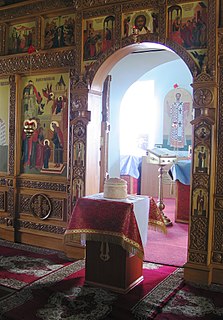 W
WAn artos is a loaf of leavened bread that is blessed during services in the Eastern Orthodox and Byzantine rite catholic churches. A large Artos is baked with a seal depicting the resurrection for use at Pascha (Easter). Smaller loaves are blessed during great vespers in a ritual called Artoklasia and in other occasions like feast days, weddings, memorial services etc.
 W
WBread and salt is a welcome greeting ceremony in some Slavic, Nordic, Baltic, Balkan and other European cultures as well as in Middle Eastern cultures. The tradition, known by local Slavic names, is also shared with some non-Slavic nations — Lithuanians, Latvians, Romanians (Romance) as well as some Finno-Ugric peoples like the Karelians — all of which are culturally and historically close to their Slavic neighbours. It is also common in Albania, Armenia, the Jewish diaspora, and the Middle East. This tradition has also been observed in spaceflight.
 W
WGebildbrot is a bread or pastry in forms of figurative representations, such as a human, hare, bird or other braidings of dough. Traditionally this pastry is made for and consumed on certain feasts of the liturgical year.
 W
WIn Sikhism, Karah is a type of whole wheat flour halva made with equal portions of whole-wheat flour, clarified butter, and sugar. It is offered to all visitors to the Darbar Sahib in a Gurdwara. It is regarded as a treat for attendees of gurmat seminars. As a sign of humanity and respect, visitors accept the Karah sitting, with hands raised and cupped. The offering and receiving of this food is a vital part of hospitality protocols. It has the same amount of whole-wheat flour, clarified butter and sugar, to emphasize the equality of men and women. The Sewadar serves it out of the same bowl to everyone in equal portions. The Karah prasad is a sacred food; if it is not accepted, it may be interpreted by some Sikhs as an insult. Karah is also taken at the initiation ceremony of Amrit Sanchar at the very end where it is shared out equally among all. It is a symbol showing that everyone is equal.
 W
WKoliva, also spelled kollyva, kollyba or colivă, is a dish based on boiled wheat that is used liturgically in the Eastern Orthodox Church for commemorations of the dead.
 W
WThe Liturgy of Preparation, also Prothesis or Proskomedia, is the name given in the Eastern Orthodox Church to the act of preparing the bread and wine for the Eucharist.
 W
WThe Lity or Litiyá is a festive religious procession, followed by intercessions, which augments great vespers in the Eastern Orthodox and Byzantine Catholic churches on important feast days. Following a lity is another liturgical action, an artoklasia, and either of these terms may be used to describe both liturgical actions collectively.
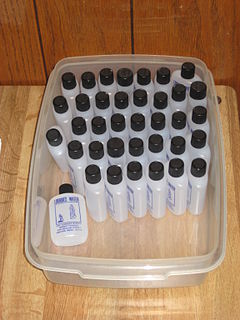 W
WLourdes water is water which flows from a spring in the Grotto of Massabielle in the Sanctuary of Our Lady of Lourdes, France. The location of the spring was described to Bernadette Soubirous by an apparition of Our Lady of Lourdes on 25 February 1858. Since that time, many thousands of pilgrims to Lourdes have followed the instruction of the Blessed Virgin Mary to "drink at the spring and bathe in it". Lourdes water is considered non-liturgical holy water.
 W
WNaivedya is a Sanskrit word meaning 'offering to God' in the stricter sense of the words. It could be any offering, tangible or intangible. A resolution, a promise or even a willingness to do, perform or restrict certain things can also connote an offering to God.
 W
WPanchamrita is a mixture of five foods used in Hindu as well as Jain worship and puja and Abhiṣeka which are usually honey, Jaggery, cow milk, curd and ghee. After panchamrita is used in puja and abhisheka, it is distributed as prasad.
 W
WPrasāda, variantly spelled as Prasādam, Prasād and Prasāda, is a material substance that is a religious offering in both Hinduism and Sikhism. Most often prasada is vegetarian food consumed by worshippers after worship. Mahaprasāda in Hinduism, similar to the langar in Sikhism, is the consecrated food offered to the deity in a Hindu temple which is then shared and eaten by the masses without discrimination. Sometimes this vegetarian offering will exclude the prohibited items such as garlic, onion, etc.
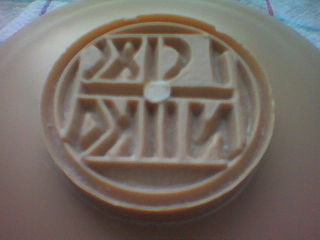 W
WA prosphoron is a small loaf of leavened bread used in Orthodox Christian and Greek Catholic (Byzantine) liturgies. The plural form is prosphora (πρόσφορα). The term originally meant any offering made to a temple, but in Orthodox Christianity and Byzantine Rite Catholicism it has come to mean specifically the bread offered at the Divine Liturgy (Eucharist).
 W
WSacramental bread is bread used in religious ritual. It is used in Christian, Mandaean, and other religions traditions. In the Torah, a sacramental bread called showbread is always to be kept as an offering on a dedicated table in the temple. Sacramental breads were also used in Mithraic ritual, and in ancient Egyptian, Aztec, and other pagan cultures.
 W
WSacramental wine, Communion wine, or altar wine is wine obtained from grapes and intended for use in celebration of the Eucharist. It is usually consumed after sacramental bread.
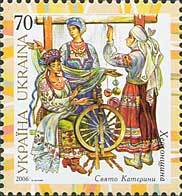 W
WSaint Catherine's Day, also called the Feast of Saint Catherine, is 25 November. It has retained its popularity throughout the centuries. It commemorates the martyrdom of Saint Catherine of Alexandria, one of the Fourteen Holy Helpers.
 W
WSlava is a Serbian Orthodox Christian tradition of the ritual of glorification of one's family's patron saint. The family celebrates the Slava annually on the saint's feast day. In November 2014 it was inscribed in UNESCO Intangible Cultural Heritage Lists of Serbia.
 W
WSoft Khichuri, also known as Norom Khichuri is one kind of rice-based meal which is similar in consistency to porridge, a popular dish in the Sylhet region of Bangladesh and India. It is a traditional food in Sylheti cuisine that is served at most dinner tables as a staple food for iftar during the holy month of Ramadan. It is eaten as a comfort food for sickness, in which case ginger is often added as a soothing ingredient. Moreover, a variant known as akhni is traditionally served to guests in Sylhet.
 W
WSt. Catherine's Taffy is a variety of taffy made by French-Canadian families to celebrate the feast day of Saint Catherine of Alexandria.
 W
WA sufra, sofra, or sofreh is a cloth or table for the serving of food, or, in an extended sense, a kind of meal, associated with Islamicate culture.
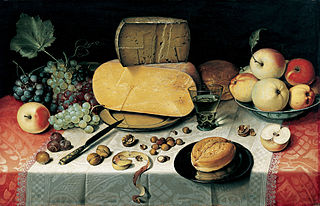 W
WSahūr or Suhūr, also called Sahari, Sahrī or Sehri is the meal consumed early in the morning by Muslims before fasting (sawm), before dawn during or outside the Islamic month of Ramadan. The meal is eaten before fajr prayer. Sahur is matched to iftar as the evening meal, during Ramadan, replacing the traditional three meals a day, although in some places dinner is also consumed after iftar later during the night.
 W
WTirupati Laddu or SriVari Laddu is the laddu sweet offered as Naivedhyam to Venkateswara at Tirumala Venkateswara Temple in Tirupati, Chittoor District, Andhra Pradesh, India. The laddu is given as prasadam to devotees after having the darshan in the temple. The laddu prasadam is prepared within the temple kitchen known as 'Potu' by the temple board Tirumala Tirupati Devasthanams. Tirupati Laddu received Geographical indication tag which entitles that only Tirumala Tirupati Devasthanams can make and sell it.
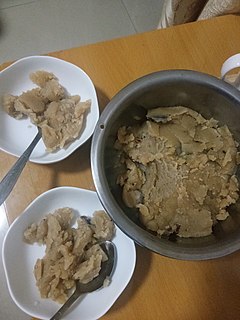 W
WTusha Shinni is one type of flour halwa, a popular desert in the Sylhet region of Bangladesh. This dish from the cuisine of Sylhet is lightly spicy, soft and sweet. This traditional food is very famous in different religious occasions.
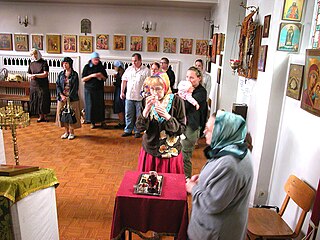 W
WZapivka is the liturgical practice in certain Orthodox Churches and certain Byzantine Rite Catholic Churches whereby the faithful will partake of antidoron and some wine diluted with warm water after receiving Holy Communion.